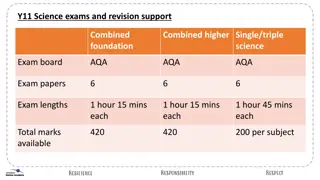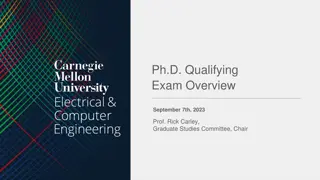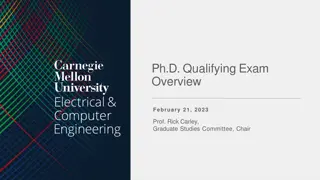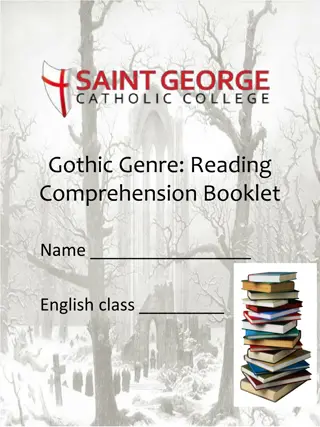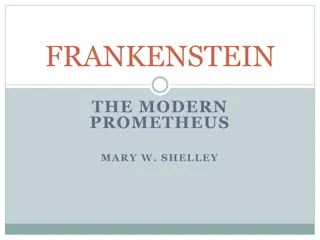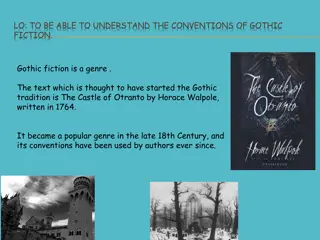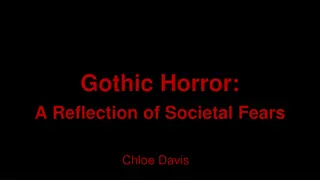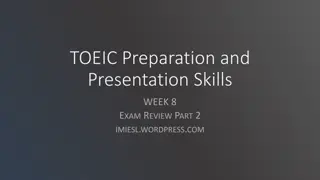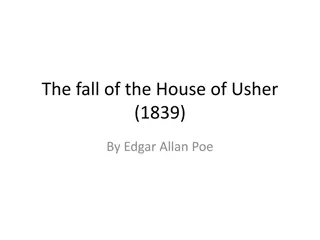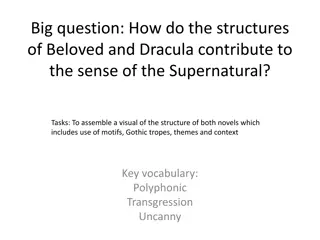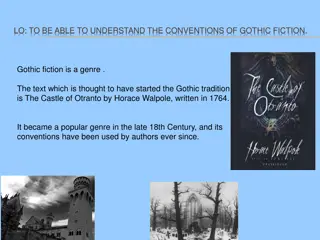Understanding Gothic Literature Features and Analysis for Exam Preparation
Explore the key features of Gothic literature, including elements like supernatural imagery, isolation, and extreme emotions. Dive into quick questions and extended response tasks to deepen understanding. Get insights on relevant vocabulary and how to analyze extracts effectively for exams.
Download Presentation

Please find below an Image/Link to download the presentation.
The content on the website is provided AS IS for your information and personal use only. It may not be sold, licensed, or shared on other websites without obtaining consent from the author. Download presentation by click this link. If you encounter any issues during the download, it is possible that the publisher has removed the file from their server.
E N D
Presentation Transcript
Quick Questions and QuADS Questions The questions can be mixed and matched and need to be taught alongside extract analysis etc.. I would suggested that the quick questions can be given as homework. Instead of printing them ask the kids to take a photo of them on their phones or give them ample time to copy them into the books to take home or put them onto the blog. The QUADS questions are intended to be extended response questions. If the kids complete this they will have a good understanding of the whole play- which is what we need for their exam. The questions at the end ( theme, character and technique) can be brought in at any time. I will put together some key scenes to be analysed for close analysis as well.
The features of Gothic Literature Gothic feature Definition Example The environment is closely linked human emotions: storms are angry, fog hides secrets, etc.... Any building which is ruined by time, damage, lack of care. Ugly buildings full of dark corners, gargoyles or mysterious rooms and spaces. Pathetic Fallacy Ruined or grotesque buildings Religious Ideas Religious ideas might include heaven/hell, good/evil, etc.. Sensibility Characters wallowing in their own feelings. Exaggerated or heightened emotional states or characters. (the cult of emotion) Excess and Extremity The Supernatural Imagery of decay Horror and terror Isolation and loneliness Extreme greed or wealth, over the top behaviour or showing off. Vampires, monsters, ghosts, ghouls, hauntings, werewolves, etc. Things rotting and breaking down. This might be people, places or objects. Scary bits for characters and readers. Characters living alone, stranded or separated from their normal lives. Characters unsure if what they are seeing is real or imagined. Characters who might be going mad. Does the audience even know? Blurring of sanity/insanity
The features of Gothic Literature Gothic feature Sex and Sexuality Multiple Narrators Crime, lawlessness and abuse Absolute power Definition Example Does this one need explaining? Lust, desire, sex, etc.! More than one narrative voice. The action might switch from character to character, or from form to form (i.e. diary entry to narration). Murder, theft, cruelty, law-breaking and general bad behaviour. A character controlling other people or places, in total control. Remember what absolute power does to people? The Satanic/ Arcane Satanic: to do with the devil and hell. Arcane: secret, mysterious, understood by few people. Identify examples of the Gothic in the extract from Frankenstein by Mary Shelley, highlight them, then copy the table into your books and put your examples in the example box. It may be a good idea to draw the boxes landscape-remember to allow plenty of space for your examples.
Relevant vocabulary Aberration (noun) An unwelcome and unexpected change from what is normal. Abhorrent (adjective) Horrifyingly bad. Allegory (noun) Allusion (noun) Anxiety (noun) Atavism (noun) Debased (adjective) Reduced in quality or value. Degenerate (noun) An immoral or corrupt person. (verb) Deteriorate mentally or physically. A story which can be seen to have a hidden meaning (which is often about society) A hint at a bigger or hidden meaning. A feeling of worry, nervousness or unease. A change back to the way your ancestors used to be. (i.e., becoming like a caveman) Depraved (adjective) Morally corrupt. Wicked. Duality (noun) Ethics (noun) Eugenics (noun) The science of improving a population by controlled breeding. Feral Metamorphosis (noun) A change from one living state to another. Perversion (noun) The corruption or ruin of something s original state. Professional (noun) A person doing a job which requires a qualification. (adjective) Totally wild, like an animal. An example of a contrast between aspects of something (i.e., man is both good and evil) Moral rules which affect a person s behaviour. Professional (noun) A person doing a job which requires a qualification. Restraint (noun) Self control. Savage (adjective) Fierce, violent, uncontrolled. Subconscious (noun) The part of the mind you re unaware of, but which influences your actions). Supernatural (noun) Something outside the laws of nature like ghosts, vampires, etc.. Unorthodox (adjective) Goes against what is normal or expected. Victorian (adjective) Something which happened while Queen Victoria ruled. Write the story of a terrible crime (it doesn t have to be Victorian). Use as many of these new words as possible. Highlight them once you have done. Lang AO5 communicate clearly, effectively and imaginatively Lang AO6/Lit AO4 accurate SPaG
Vocabulary Quiz Which noun is the part of the mind you re unaware of, but which influences your actions? Subconscious. Supernatural. Consciousness. Ethics. Which adjective describes something which goes against what is normal or expected? Depraved. Unorthodox. Abhorrent. Savage. Which noun is a change back to the way your ancestors used to be (i.e., becoming like a caveman)? Duality. Repression. Aberration. Atavism. Which adjective describes something which is wild and animalistic? Unorthodox. Feral. Abhorrent. Savage. Which adjective means fierce, violent, uncontrolled ? Depraved. Feral. Abhorrent. Savage. What name is given to two opposites which cannot exist without each other? Duality. Aberration. Atavism. Repression. A metamorphosis is A change from one state to another. A moral rule that affects behaviour. A hint at a hidden meaning. An unwelcome and unexpected change. An aberration is An unwelcome and unexpected change. A story with a hidden meaning. A hint at a hidden meaning. A moral rule that affects behaviour.
Chapter Summaries Chapter One: The Story of the Door: Passing a strange-looking door whilst out for a walk, Enfield tells Utterson about incident involving a man (Hyde) trampling on a young girl. The man paid the girl compensation. Enfield says the man had a key to the door (which leads to Dr Jekyll s laboratory). Chapter Two: Search for Hyde: Utterson looks at Dr Jekyll s will and discovers that he has left his possessions to Mr. Hyde in the event of his disappearance. Utterson watches the door and sees Hyde unlock it, then goes to warn Jekyll. Jekyll isn t in, but Poole tells him that the servants have been told to obey Hyde. Chapter Three: Dr Jekyll was Quite at Ease: Two weeks later, Utterson goes to a dinner party at Jekyll s house and tells him about his concerns. Jekyll laughs off his worries. Chapter Four: The Carew Murder Case: Nearly a year later, an elderly gentleman is murdered in the street by Hyde. A letter to Utterson is found on the body. Utterson recognises the murder weapon has a broken walking cane of Jekyll s. He takes the police to Jekyll s house to find Hyde, but are told he hasn t been there for two months. They find the other half of the cane and signs of a quick exit. Chapter Five: Incident of the Letter: Utterson goes to Jekyll s house and finds him looking deadly sick . He asks about Hyde but Jekyll shows him a letter that says he won t be back. Utterson believes the letter has been forged by Jekyll to cover for Hyde. Chapter Six: Remarkable Incident of Dr Lanyon:Hyde has disappeared and Jekyll seems more happy and sociable until a sudden depression strikes him. Utterson visits Dr Lanyon on his death- bed, who hints that Jekyll is the cause of his illness. Utterson writes to Jekyll and receives a reply that suggests he is has fallen under a dark influence . Lanyon dies and leaves a note for Utterson to open after the death or disappearance of Jekyll. Utterson tries to revisit Jekyll but is told by Poole that he is living in isolation. Chapter Seven: Incident at the Window: Utterson and Enfield are out for walk and pass Jekyll s window, where they see him confined like a prisoner. Utterson calls out and Jekyll s face has a look of abject terror and despair . Shocked, Utterson and Enfield leave. Chapter Eight: The Last Night:Poole visits Utterson and asks him to come to Jekyll s house. The door to the laboratory is locked and the voice inside sounds like Hyde. Poole says that the voice has been asking for days for a chemical to be brought, but has rejected it each time as it is not pure. They break down the door and find a twitching body with a vial in its hands. There is also a will which leaves everything to Utterson and a package containing Jekyll s confession and a letter asking Utterson to read Lanyon s letter. Chapter Nine: Dr Lanyon s Narrative:The contents of Lanyon s letter tells of how he received a letter from Jekyll asking him to collect chemicals, a vial and notebook from Jekyll s laboratory and give it to a man who would call at midnight. A grotesque man arrives and drinks the potion which transforms him into Jekyll, causing Lanyon to fall ill. Chapter Ten: Henry Jekyll s Full Statement of the Case: Jekyll tells the story of how he turned into Hyde. It began as a scientific investigation into the duality of human nature and an attempt to destroy his darker self . Eventually he became addicted to being Hyde, who increasingly took over and destroyed him.
Quick Questions- Context 1. Which monarch was on the throne when Jekyll and Hyde was published? 2. Give one reason why a man would want to be a gentleman. 3. Which of the following statements about Victorian gentlemen is not true? They were vulnerable to blackmail. They did not care about their appearance. They were obsessed with their reputations. 4. Give two examples of problems with slum housing in London. 5. Why did Victorian London suffer from smoke? 6. Which branch of Christianity particularly influenced Victorian life? 7. What was the name of Darwin s famous book on evolutionary theory? 8. What year was the book published?
QuADS Questions- Context 1. In the first chapter of the novel, how does Stevenson suggest that Gabriel Utterson is a gentleman? 2. Give an example from the novel and explain how it highlights that reputation is important to the following characters: Mr Enfield and Dr Lanyon. 3. What evidence is there in Jekyll and Hyde that society and Victorian London was religious? 4. Using what you know about the period, why might Hyde be particularly frightening for the Victorian readers?
Quick Questions- plot 1. Briefly explain how Enfield reacts to Hyde s character. 2. Why does Utterson think that Jekyll has put Hyde in his will? 3. How does Jekyll react when Utterson tries to question him about his will? 4. How does Hyde react when Sir Danvers Carew stops to talk to him? 5. Why does Jekyll suddenly shut his window when talking to Utterson and Enfield? 6. Give one example of Jekyll s strange behaviour, which Poole describes to Utterson. 7. Briefly explain what Utterson and Poole find wen they break into Jekyll s cabinet. 8. What does Lanyon reveal about the relationship between Jekyll and Hyde in his letter to Utterson? 9. Why does finding out Jekyll s secret result in Lanyon s death? 10. Why does Hyde start to play ape-like tricks on Jekyll?
QuADS Questions-Plot 1. Explore how the murder of Carew is a key turning point in the novel. 2. Describe the relationship between Jekyll s house and the laboratory. 3. Why did Jekyll find a way to split himself in two?
Quick Questions- Character 1. Give one example to suggest that Jekyll fits into the respectable society. 2. Why does Jekyll think that his sins are worse than they are? 3. Which three words would best describe Hyde? 4. Write down two of Hyde s physical features that people find disturbing. 5. Find evidence form the text that suggests that Utterson is a rational man. 6. Give one reason why Utterson is so interested in Hyde. 7. Give one similarity and one difference between Lanyon and Jekyll. 8. Why is Lanyon, as a scientist, so shocked by Jekyll s discovery? 9. Give two example that highlight how Enfield s character reflects the Victorian values. 10.What is Poole s job?
QuADS Questions-Character 1. Explore the presentation of the character of Dr Jekyll within the novel. 2. Find three examples where Stevenson describes Hyde as being like an animal in the novel. 3. Describe Jekyll s attitude towards science in the novel. 4. Give two ways that Hyde is the opposite of Jekyll. 5. Compare Jekyll's attitude to Hyde when he turns into Hyde for the first time and then after the murder of Carew. 6. In what ways does Utterson repress his desires? 7. Explain Utterson s attitude to his darker side and the darker side of others. 8. Compare Lanyon s character when we first meet him to his character after he learns Jekyll s secret. 9. How does Stevenson use Enfield to explore the theme of the dual nature of man? 10. Discuss three reasons why Poole is concerned about Jekyll.
Exam style question-extract based Using the passage below (extract taken from the last night) as a starting point, explore how Utterson s character influences the way he approaches the mystery. 1. How does Stevenson use descriptions and imagery to present Hyde as an evil character? 2. To what extent does Stevenson present Jekyll as a sympathetic character? 3. Describe how the relationship between Jekyll and Hyde changes throughout the novel.
Quick Questions- Themes 1. What is Utterson worrying about when he says to Jekyll, If it came to a trial, your name might appear. Is the following statement true or false? Jekyll first starts to feel like he is leading a double life after he has created Hyde. Find evidence form the text that suggests that Hyde is a) the sinful side of Jekyll. B) the uncivilised side of Jekyll. What is Lanyon s attitude towards Jekyll s scientific work? Give an example from the novel of how science is portrayed as a) unsettling and b) powerful. Give one example of how Jekyll s experiment goes against Christianity. In what way is Jekyll s experiment a failure? Give an example of the secretive behaviour of each of these characters: a) Mr Enfield b) Mr Utterson Why do Utterson and Enfield agree not to speak about Hyde? 10. Give one example of when a gentleman plays down something uncivilised in the novel. 2. 3. 4. 5. 6. 7. 8. 9.
QuADS Questions-theme 1. How does Stevenson suggest that reputations cannot be trusted? 2. Which character in the novel do you think is most concerned about reputation? 3. To what extent is Jekyll s experiment successful? 4. Henry Jekyll is the most obviously divided character in the novel. Select another character in the novel and explain how Stevenson demonstrates that they have two sides to their personality. 5. Explore the differences between Lanyon s and Jekyll s attitudes to science. 6. Briefly outline why religion and science were in conflict during the Victorian era. 7. How does Stevenson present the gentlemen in the novel s attitude to secrecy? 8. Why do you think Utterson leaves Lanyon s letter unread until the end of the novel?
Exam style question-Extract analysis theme Using the extract ( Henry Jekyll s full statement of the case) below as a starting point, explain how Stevenson presents science in the novel. 1. Utterson's concern for Jekyll s reputation does them both more harm than good. How far would you agree with this statement? 2. In his final statement, Jekyll writes that man is not truly one, but truly two. In what ways does Stevenson suggest that Jekyll is right? 3. How does Stevenson use the theme of secrecy to create suspense in the novel?
Quick Questions- technique 1. Which character s experiences does the main narrative follow? 2. A) what is an embedded narrative? B) give one example of an embedded narrative in the novel. 3. Give one example of a letter that adds intrigue in the novel. 4. Find evidence from the text where the streets of London are described as: foggy, empty and dark. 5. Give one example of an object from the novel that has symbolic meaning. 6. How is Poole s language different from the gentlemen s language? 7. How is Hyde s language different from the gentlemen s language? 8. Identify an example of personification in the novel explore its effect. 9. Identify a key quotation that would suggest that the setting of the novel is mysterious.
QuADS Questions- technique 1. Describe in detail the effect of using embedded narratives in the novel. 2. Of all the letters (don t count Lanyon s and Jekyll s letters) in the narrative, which do you think is the most important? 3. Describe the importance of the novels title and chapter titles and the impact that they have on the novel as a whole. 4. What is the effect of the fog in the novel? 5. In what ways does Jekyll s house symbolise his character? 6. How does Stevenson use dialogue to develop his characters in the novel? 7. When he describes seeing Hyde, Poole says, the hair stood upon my head like quills. What is the effect of this simile? 8. How does the idea of the double used in Jekyll and Hyde? 9. Discuss how Jekyll and Hyde employs the features of the traditional Gothic novel and give one example which highlights how it is different.
Exam style question- Extract question- technique Using the extract (Search for Mr Hyde) below as a starting point, explain how Stevenson creates mysterious settings. 1. Analyse the narrative structure of the novel and explain its effect on the reader. 2. Explore the effects of Stevenson's use of symbolism in the novel. 3. Read the passage in The Last Night that begins Mr Utterson s nerves, at this unlooked-for termination and ends it doesn t comment itself to reason. How does the language of this passage create an atmosphere of tension and secrecy?
In this extract, Enfield recalls how Mr Hyde trampled over a young girl... In this extract, Enfield recalls how Mr Hyde trampled over a young girl... All at once, I saw two figures: one a little man who was stumping along eastward at a good walk, and the other a girl of maybe eight or ten who was running as hard as she was able down a cross street. Well, sir, the two ran into one another naturally enough at the corner; and then came the horrible part of the thing; for the man trampled calmly over the, child s body and left her screaming on the ground. It sounds nothing to hear, but it was hellish to see. It wasn t like a man; it was like some damned Juggernaut. I gave a view-halloa, took to my heels, collared my gentleman, and brought him back to where there was already quite a group about the screaming child. He was perfectly cool and made no resistance, but gave me one look, so ugly that it brought out the sweat on me like running. The people who had turned out were the girl s own family; and pretty soon, the doctor, for whom she had been sent, put in his appearance. Well, the child was not much the worse, more frightened, according to the Sawbones; and there you might have supposed would be an end to it. But there was one curious circumstance. I had taken a loathing to my gentleman at first sight. He is not easy to describe. There is something wrong with his appearance; something displeasing, something downright detestable. I never saw a man I so disliked, and yet I scarce know why. He must be deformed somewhere; he gives a strong feeling of deformity, although I couldn t specify the point. He s an extraordinary-looking man, and yet I really can name nothing out of the way. No, sir; I can make no hand of it; I can t describe him. And it s not want of memory; for I declare I can see him this moment.
How is Hyde presented in this extract? Key quotation: Key quotation: Key quotation: Key quotation: Key quotation KILLER QUOTATION:
Breaking down the exam extract question Stretch yourself by including sophisticated vocabulary: aberration, degenerate, depraved, savage How is Hyde presented in this extract? How does the writer achieve it? Identify a technique and interesting use of language Use a quotation every time Organise in the QuADS structure Why is it effective? Link to specific words used What does it make you (the reader) feel/do? What are the connotations (layers of interpretation)? Does it have an emotional impact (be specific)? Lit AO1: Use textual references, including quotations, to support and illustrate interpretations. Lit AO1: Read, understand and respond to texts, maintain a critical style and develop an informed personal response. Lit AO2: Analyse the language, form and structure used to create meanings and effects, using relevant subject terminology where appropriate. You should aim for 6 QuADS paragraphs in your response.
Example Stevenson describes Hyde trampling calmly over the child s body. This seems to be a contradiction: the verb "trampling is an angry, out-of-control action and it should not be possible to do it calmly. Perhaps Stevenson is hinting that Hyde has a contradictory nature early on, foreshadowing the events to come. It s a very emotive thing to happen. A young child is usually seen as totally innocent, so trampling her and leaving her screaming is especially shocking. From the start, the audience is positioned against Hyde and given a strong indication of his brutal nature.
Location, location, location Stevenson was brought up in Edinburgh and was fascinated by the contrast between its new town and the medieval old town . In the former, wide streets and spacious squares were bright and airy, but the latter was filled with gloomy alleyways and narrow terraces. Stevenson was drawn, like a moth to a flame, to these older, darker areas. It was here that he discovered Deacon Brodie a local cabinet maker and thief who helped him to see that men often had hidden darkness behind their eyes. Other Edinburgh criminals influenced Stevenson too he once wrote a story called The Body snatchers based on the infamous duo Burke and Hare two murderers who suffocated their victims and sold the bodies to medical science. Throughout the novel, Stevenson goes out of his way to establish a link between the urban landscape of Victorian London and the dark events surrounding Hyde. He achieves his desired effect through the use of nightmarish imagery, in which dark streets twist and coil, or lie draped in fog, forming a sinister landscape suitable for the crimes that take place there.
Location, location, location Chilling visions of the city appear in Utterson s nightmares as well, like in the extract below: He would be aware of the great field of lamps of a nocturnal city. . . . The figure [of Hyde] . . . haunted the lawyer all night; and if at any time he dozed over, it was but to see it glide more stealthily through sleeping houses, or move the more swiftly . . . through wider labyrinths of lamp-lighted city, and at every street corner crush a child and leave her screaming. In such images, Stevenson paints Hyde as an urban creature, utterly at home in the darkness of London where countless crimes take place, the novel suggests, without anyone knowing. Why do you think authors would be interested in writing about the darker side of towns like London?
In these extracts, Stevenson describes the London setting... In these extracts, Stevenson describes the London setting... It chanced on one of these rambles that their way led them down a by-street in a busy quarter of London. The street was small and what is called quiet, but it drove a thriving trade on the weekdays. The inhabitants were all doing well, it seemed and all hoping to do better still - the shop fronts stood along that thoroughfare with an air of invitation, like rows of smiling saleswomen. Even on Sunday, when it veiled its more florid charms and lay comparatively empty of visitors, the street shone out in contrast to its dingy neighbourhood, like a fire in a forest; and with its freshly painted shutters, well-polished brasses, and general cleanliness and cheerfulness of note, instantly caught and pleased the eye of the passenger. Then later... Two doors from one corner, on the left hand going east the line was broken by the entry of a court; and just at that point a certain sinister block of building thrust forward its gable on the street. It was two storeys high; showed no window, nothing but a door on the lower storey and a blind forehead of discoloured wall on the upper; and bore in every feature, the marks of prolonged and sordid negligence. The door, which was equipped with neither bell nor knocker, was blistered and distained. Tramps slouched into the recess and struck matches on the panels; children kept shop upon the steps; the schoolboy had tried his knife on the mouldings; and for close on a generation, no one had appeared to drive away these random visitors or to repair their ravages.
What do these descriptions of places tell us about Stevensons What do these descriptions of places tell us about Stevenson s fascination with the city streets? fascination with the city streets? Key quotation: Key quotation: Key quotation: Key quotation: Key quotation: KILLER QUOTATION:
Breaking down the exam extract question What do these descriptions of places tell us about Stevenson s fascination with the city streets? How does the writer achieve it? Identify a technique and interesting use of language Use a quotation every time Organise in the QuADS structure Why is it effective? Link to specific words used What does it make you (the reader) feel/do? What are the connotations (layers of interpretation)? Does it have an emotional impact (be specific)? Context Does it link to Victorian society, values or beliefs? Does it link to Stevenson s own life? Lit AO1: Use textual references, including quotations, to support and illustrate interpretations. Lit AO1: Read, understand and respond to texts, maintain a critical style and develop an informed personal response. Lit AO2: Analyse the language, form and structure used to create meanings and effects, using relevant subject terminology where appropriate. Lit AO3: Show understanding of the relationships between texts and the contexts in which they were written.
Example Stevenson creates a huge contrast between the two descriptions, using positive language in one and negative language in the other. Stevenson grew up in Edinburgh, a city with great contrasts between its spacious, clean new town and its dark, claustrophobic old town . This has influenced his work, with this fascination reflected in the vibrant description of London and the gloomy, run-down version. The characters who inhabit these streets reflect their surroundings. Smiling saleswomen are juxtaposed with slouching tramps , and even the schoolboy mentioned is menacing as he carries a knife . The sense that London s night-time streets are a place to be feared is obvious, and suggests that further crimes may be committed in the sinister streets. As a child, Stevenson was drawn to these dark places against his parents wishes, and it is little surprise that he chose to put his villain in similar dark and dingy locations Stevenson learned to associate them with criminality, making them the perfect setting for a story about a man exploring the darker, immoral side of his personality.
In this extract(chpt 2), Utterson meets Hyde for the first time... In this extract(chpt 2), Utterson meets Hyde for the first time... Mr. Hyde was pale and dwarfish, he gave an impression of deformity without any nameable malformation, he had a displeasing smile, he had borne himself to the lawyer with a sort of murderous mixture of timidity and boldness, and he spoke with a husky, whispering and somewhat broken voice; all these were points against him, but not all of these together could explain the hitherto unknown disgust, loathing, and fear with which Mr. Utterson regarded him. There must be something else, said the perplexed gentleman. There is something more, if I could find a name for it. God bless me, the man seems hardly human! Question: How does Stevenson create a sense of horror in this extract? Key Quotation: Key Quotation: Key Quotation: Key Quotation: Killer Quotation:
Breaking down the exam extract question How does Stevenson create a sense of horror in this extract? Stretch yourself by including sophisticated vocabulary: unorthodox, debased, degenerate, allusion How does the writer achieve it? Identify a technique and interesting use of language Use a quotation every time Organise in the QuADS structure Why is it effective? Link to specific words used What does it make you (the reader) feel/do? What are the connotations (layers of interpretation)? Does it have an emotional impact (be specific)? Context Does it link to Victorian society, values or beliefs? Does it link to Stevenson s own life? Lit AO1: Use textual references, including quotations, to support and illustrate interpretations. Lit AO1: Read, understand and respond to texts, maintain a critical style and develop an informed personal response. Lit AO2: Analyse the language, form and structure used to create meanings and effects, using relevant subject terminology where appropriate. Lit AO3: Show understanding of the relationships between texts and the contexts in which they were written.
Example Stevenson creates a character whose appearance is deeply unsettling through his use of adjectives such as pale and dwarfish , murderous and broken. His purpose is to make his audience fear Hyde and what he is capable of by creating a character who, despite his strange and small appearance, is capable of horrific violence like the attack on the innocent young girl in chapter one. Dwarfish and pale suggest a deformity which is not particularly gruesome or horrible, and many readers would not see these as problematic. But Stevenson goes further by including Utterson s reaction he sees him with disgust, loathing and fear and as Utterson is a sensible and reasonable character, this strong reaction carries more weight for a reader and convinces them that Hyde is a horrific character. There are strong echoes here of Stevenson s own childhood: he suffered a thyroid complaint as a youngster which left him with elongated bones perhaps his exploration of Hyde s character reflects his concerns about his own malformation and how others saw him.
In this extract (chpt 3), Utterson meets Hyde for the first time... In this extract (chpt 3), Utterson meets Hyde for the first time... A FORTNIGHT later, by excellent good fortune, the doctor gave one of his pleasant dinners to some five or six old cronies, all intelligent, reputable men and all judges of good wine; and Mr. Utterson so contrived that he remained behind after the others had departed. This was no new arrangement, but a thing that had befallen many scores of times. Where Utterson was liked, he was liked well. Hosts loved to detain the dry lawyer, when the light-hearted and the loose-tongued had already their foot on the threshold; they liked to sit a while in his unobtrusive company, practising for solitude, sobering their minds in the man s rich silence after the expense and strain of gaiety. To this rule, Dr. Jekyll was no exception; and as he now sat on the opposite side of the fire a large, well-made, smooth-faced man of fifty, with something of a slyish cast perhaps, but every mark of capacity and kindness you could see by his looks that he cherished for Mr. Utterson a sincere and warm affection. I have been wanting to speak to you, Jekyll, began the latter. You know that will of yours? [...] My good Utterson, said the doctor, this is very good of you, this is downright good of you, and I cannot find words to thank you in. I believe you fully; I would trust you before any man alive, ay, before myself, if I could make the choice; but indeed it isn t what you fancy; it is not so bad as that; and just to put your good heart at rest, I will tell you one thing: the moment I choose, I can be rid of Mr. Hyde. I give you my hand upon that; and I thank you again and again; and I will just add one little word, Utterson, that I m sure you ll take in good part: this is a private matter, and I beg of you to let it sleep.
Question: How is Dr Jekyll presented in this extract? Question: How is Dr Jekyll presented in this extract? Key Quotation: Key Quotation: Key Quotation: Key Quotation: Key Quotation: Killer Quotation:
Breaking down the extract exam question How is Dr Jekyll presented in this extract? You must use the word duality in your answer. How does the writer achieve it? Identify a technique and interesting use of language Use a quotation every time Organise in the QuADS structure Why is it effective? Link to specific words used What does it make you (the reader) feel/do? What are the connotations (layers of interpretation)? Does it have an emotional impact (be specific)? Context Does it link to Victorian society, values or beliefs? Does it link to Stevenson s own life? Lit AO1: Use textual references, including quotations, to support and illustrate interpretations. Lit AO1: Read, understand and respond to texts, maintain a critical style and develop an informed personal response. Lit AO2: Analyse the language, form and structure used to create meanings and effects, using relevant subject terminology where appropriate. Lit AO3: Show understanding of the relationships between texts and the contexts in which they were written.
Example response Stevenson presents Jekyll as a good, reasonable man with every mark of capacity and kindness. In order to show just how horrific Hyde is, Stevenson must create a character who is his opposite: someone who is sincere and warm . The obvious contrast between the two represents the duality of man something of great interest to the author. Jekyll attempts to flatter Utterson as he tries to convince him that Hyde is under control, repeatedly referring to him as good . Perhaps this is meant to sound a little overdone almost as if Jekyll is trying too hard to convince Utterson of something he doesn t entirely believe himself. Perhaps this flattery is simply a pretence one which is stripped away when he takes the potion. Stevenson seems to suggest that man s true nature is more animalistic maybe Jekyll has just been good at hiding it so far. This might be an uncomfortable idea for those in Victorian society, who were likely to see good and bad as opposites, not two parts of one person.
In this extract (chpt4), the maid describes Carews murder... In this extract (chpt4), the maid describes Carew s murder... Presently her eye wandered to the other, and she was surprised to recognise in him a certain Mr. Hyde, who had once visited her master and for whom she had conceived a dislike. He had in his hand a heavy cane, with which he was trifling; but he answered never a word, and seemed to listen with an ill-contained impatience. And then all of a sudden he broke out in a great flame of anger, stamping with his foot, brandishing the cane, and carrying on (as the maid described it) like a madman. The old gentleman took a step back, with the air of one very much surprised and a trifle hurt; and at that Mr. Hyde broke out of all bounds and clubbed him to the earth. And next moment, with ape-like fury, he was trampling his victim under foot and hailing down a storm of blows, under which the bones were audibly shattered and the body jumped upon the roadway. At the horror of these sights and sounds, the maid fainted. It was two o'clock when she came to herself and called for the police. The murderer was gone long ago; but there lay his victim in the middle of the lane, incredibly mangled. The stick with which the deed had been done, although it was of some rare and very tough and heavy wood, had broken in the middle under the stress of this insensate cruelty; and one splintered half had rolled in the neighbouring gutter the other, without doubt, had been carried away by the murderer. A purse and a gold watch were found upon the victim: but no cards or papers, except a sealed and stamped envelope, which he had been probably carrying to the post, and which bore the name and address of Mr. Utterson.
Why is Hydes attack on Carew so shocking? Why is Hyde s attack on Carew so shocking? Key Quotation: Key Quotation: Key Quotation: Key Quotation: Key Quotation: Killer Quotation:
Breaking down the exam extract question Why is Hyde s attack on Carew so shocking? Stretch yourself by using the following words in your answer: feral, savage, depraved, abhorrent, atavistic How does the writer achieve it? Identify a technique and interesting use of language Use a quotation every time Organise in the QuADS structure Why is it effective? Link to specific words used What does it make you (the reader) feel/do? What are the connotations (layers of interpretation)? Does it have an emotional impact (be specific)? Context Does it link to Victorian society, values or beliefs? Does it link to Stevenson s own life? Lit AO1: Use textual references, including quotations, to support and illustrate interpretations. Lit AO1: Read, understand and respond to texts, maintain a critical style and develop an informed personal response. Lit AO2: Analyse the language, form and structure used to create meanings and effects, using relevant subject terminology where appropriate. Lit AO3: Show understanding of the relationships between texts and the contexts in which they were written.
Example response Hyde s attack on Carew is deeply shocking because of its brutality. In a savage attack and with ape-like fury he leaves the old man s bones audibly shattered. Stevenson plays on the reader s concerns, comparing Hyde s feralbehaviour to an ape . Many people were aware of Darwin s theory of evolution and were angered and upset at the scientist pointing out how closely humans are related to animals, and this attack shows man at his most animalistic unable to restrain his wilder instincts. The damage done to Carew is particularly upsetting. His bones were heard to crack and he and his property are splintered and left in the gutter . These words are almost onomatopoeic, enabling the reader to almost hear the abhorrent attack. The fact that Carew s purse and a gold watch are left untouched makes the attack even worse, as it appears Hyde s motives are not robbery, but a senseless and needless attack on a completely innocent man. Again, Stevenson gives us an insight into the depraved side of a respectable man, suggesting that repressed Victorians might also be capable of such acts if they allowed their subconscious to rule their behaviour. Perhaps he s also hinting that our behaviour was more like this once, and that Hyde is an atavistic version of Jekyll.
http://www.gardenpsychology.co.uk/wp-content/uploads/2014/03/id-ego-e-superego-5.jpghttp://www.gardenpsychology.co.uk/wp-content/uploads/2014/03/id-ego-e-superego-5.jpg Critical theory: Sigmund Freud Shortly after Jekyll & Hyde was written, a famous psychoanalyst called Sigmund Freud developed a theory about human nature. He thought our personalities could be divided into three different parts: The Id: this is the animalistic wild part of the brain. It seeks pleasure and avoids pain. The Ego: the decision making part of the brain. It uses reason and logic to make the Id behave. The Superego: the voice that incorporates society s values and morals. We can use Freud s theory when we look at Dr Jekyll and Mr Hyde. Hyde is the animalistic, wild part of Jekyll s personality his Id. Jekyll keeps him under control as long as he can, with his Superego repressing his true desires. But once he drinks the potion, his wild side is released and because it has been kept repressed for so long, once it is unleashed it is bigger and stronger than it would have been if he had expressed it naturally. Jekyll himself knows this when he describes the murder of Carew: My devil had been long caged, and he came out roaring. I was conscious, even when I took the draught, of a more unbridled, a more furious propensity to ill.
In this extract (chpt5), Jekyll as described as being incredibly ill... In this extract (chpt5), Jekyll as described as being incredibly ill... Mr. Utterson was at last received into the doctor's cabinet. It was a large room, fitted round with glass presses, furnished, among other things, with a cheval-glass and a business table, and looking out upon the court by three dusty windows barred with iron. A fire burned in the grate; a lamp was set lighted on the chimney shelf, for even in the houses the fog began to lie thickly; and there, close up to the warmth, sat Dr. Jekyll, looking deadly sick. He did not rise to meet his visitor, but held out a cold hand and bade him welcome in a changed voice. "And now," said Mr. Utterson, as soon as Poole had left them, "you have heard the news?" The doctor shuddered. "They were crying it in the square," he said. "I heard them in my dining-room." "One word," said the lawyer. "Carew was my client, but so are you, and I want to know what I am doing. You have not been mad enough to hide this fellow? "Utterson, I swear to God," cried the doctor, "I swear to God I will never set eyes on him again. I bind my honour to you that I am done with him in this world. It is all at an end. And indeed he does not want my help; you do not know him as I do; he is safe, he is quite safe; mark my words, he will never more be heard of."
What effect is Mr Hyde having on Dr Jekyll? What effect is Mr Hyde having on Dr Jekyll? Key Quotation: Key Quotation: Key Quotation: Key Quotation: Key Quotation: Killer Quotation:
Breaking down the extract exam question What effect is Mr Hyde having on Dr Jekyll? Stretch yourself: as well as talking about the physical effects, talk about the mental effects Hyde is having on Jekyll. Using words like repress, subconscious and conscience would be particularly impressive. How does the writer achieve it? Identify a technique and interesting use of language Use a quotation every time Organise in the QuADS structure Why is it effective? Link to specific words used What does it make you (the reader) feel/do? What are the connotations (layers of interpretation)? Does it have an emotional impact (be specific)? Context Does it link to Victorian society, values or beliefs? Does it link to Stevenson s own life? Lit AO1: Use textual references, including quotations, to support and illustrate interpretations. Lit AO1: Read, understand and respond to texts, maintain a critical style and develop an informed personal response. Lit AO2: Analyse the language, form and structure used to create meanings and effects, using relevant subject terminology where appropriate. Lit AO3: Show understanding of the relationships between texts and the contexts in which they were written.
identify the different AOs where they appear. Example response It seems that the pressure of living with Hyde is having a terrible effect on Dr Jekyll s health, as he is described as looking deadly sick . It is clear that living with the knowledge that Hyde is on the loose and committing crimes is worrying Jekyll, and Stevenson wants us to see this through his use of verbs such as shuddered and cried . He is no longer at ease and is unable to hide his feelings. Perhaps Stevenson described his sickness as deadly because being unable to repress his subconscious desires has really led to a deadly incident when Carew was murdered. Jekyll must have a guilty conscience about this, which is shown when he cries out to Utterson to explain that he ll never set eyes on him (Hyde) again . At this point, he can t repress his morals any longer, just like he is struggling to repress Hyde. For many in Victorian society, this struggle to appear respectable was a real issue. In the modern world, we are much more open about sharing our thoughts and feelings, but the Victorians were much more emotionally repressed. Living in a very judgemental society must have made it difficult to discuss the less pleasant side of our personalities, and bottling up your feelings is now seen as unhealthy. Perhaps Stevenson was giving a voice to concerns many people had about themselves.


